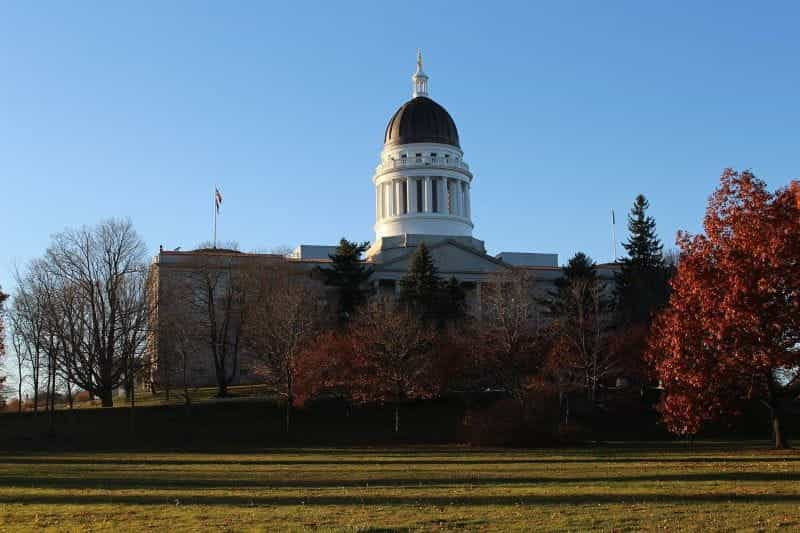Maine Sports Betting Bill Finally Passes
A piece of legislation legalizing and regulating sports betting in Maine has passed through the state’s Senate by 23 votes to 12 and passed the House for engrossment, following the submission of new amendments to the bill. Initially introduced in April, Senate Bill 1352 was amended to change who can receive a betting license.

A bill legalizing and regulating sports betting in Maine has passed through the state’s Senate by 23 votes to 12 and passed the House for engrossment, following recent amendments to the bill. ©fantasyskyart/Pixabay
New Version of Bill Limits Licenses Only to Casinos
The state of Maine’s legislature has passed a newly amended bill which will both legalize and regulate sports betting in the state. The piece of legislation passed through the state’s Senate by 23 votes to 12 and also passed the House for engrossment after new amendments were submitted.
First introduced in April 2021 by Senator Louis Luchini, Senate Bill 1352 ended up being amended quite heavily further down the line, bringing with it significant changes to who exactly can receive a sports betting license in Maine.
The initial version of Maine’s sports betting bill allowed betting venues such as commercial racetracks, off-track betting facilities, slot machine or casino operators and federally recognized tribes to be licensed.
Now, however, only casinos can hold sports betting licenses, as part of the recently amended bill. These changes arrived when the Senate passed the bill in a special legislative session, which followed its regularly scheduled session.
Amendments to Maine Sports Betting Bill are Numerous
Senate Bill 1352, which is set to legalize and regulate sports betting in Maine, has gone through numerous versions in its somewhat short lifespan, taking the form of amendments to license recipients and fees, as well as gambling advertising and other regulations.
For one, the starting and renewal fees for a sports betting license were raised from $20,000 up to $100,000. Also, the need for authorization from a qualified gaming entity to obtain a license was removed and so was an obligation to report irregular wagering activity to the department of Public Safety Gambling Control Unit.
A ban on sports betting advertising to those under the age of 21 was also added to the bill, along with placing any marketing materials near schools. Betting on college sports in Maine will be permitted, as long as a Maine team isn’t playing in the match in question.
Also stated in the bill’s amendments is the requirement that 0.55% of the adjusted gross sports wagering receipts shall be distributed to groups which conduct live harness racing in Maine run by the State Harness Racing Commission. An additional 0.55% will be sent to the Sire Stakes Fund, while 0.4% will be given to the Agricultural Fair Promotion Fund.
With all these amendments in tow, the bill was then sent to the House, where the Senate amendments were first applied. The House’s amendment of the Senate amendment has not yet been revealed at the time of writing.
After its first reading, the bill was passed to be engrossed — a process which will see the bill being sent back to the Senate in order for it to approve any changes made by the House. If both the Senate and House pass the bill, it will then finally be sent to the Governor where, if signed, will become law.
Governor Mills Urged to Accept Sports Betting in 2020, Only to Veto Bill
Despite passing in the Senate, as well as the House for engrossment, the bill to legalize and regulate sports betting in Maine still needs to be sent to Democrat Governor Janet Mills’ office. The governor always has the ability to veto the bill, which she in fact did with an earlier attempt at legislating sports betting.
In January 2020, Governor Mills was urged to sign bill LD 553, titled “An Act To Ensure Proper Oversight of Sports Betting in the State,” after an opinion piece by Representative Scott Strom was published.
The bill sought to legalize both land-based and mobile sports wagering in Maine, making licenses available to 11 land-based gambling venues in the state including one racetrack, six casinos, and four separate betting venues.
However, despite claims by Strom that legalizing sports betting would help to better protect Maine residents, Governor Mills made the somewhat unprecedented move of vetoing the bill entirely, believing that the people of Maine were not ready for sports betting.
She did commend the bill for attempting to wrench sports betting out of the hands of the black market:
“I believe this bill is a good effort by those who wish to bring out into the open a black market activity that is practiced by many now and who want to regulate that activity without over-regulating or overtaxing it so as to drive it back underground. The bill is a step forward towards achieving that delicate balance.”– Janet Mills, Governor of Maine
However she remained firm in her belief that the bill, at least at that point in time, did not represent the true will of the people of Maine: “But, respectfully, I remain unconvinced at this time that the majority of Maine people are ready to legalize, support, endorse and promote betting on competitive athletic events.”
Nebraska Also Recently Passed Sports Betting Bill
As sports betting legislation begins to appear more and more nationwide, Nebraska recently became the latest state to advance its own legislation, following the passing of legislation through the state’s unicameral legislature.
First introduced on January 19th, 2021, Legislative Bill 561 will legalize in-person sports betting at all licensed race tracks across the state, with the legislation being propelled forward thanks to the inclusion of an emergency clause, thereby allowing it to take immediate effect once signed by Governor Ricketts instead of having to wait three months.
Much like Maine, LB 561 has its origins in an earlier attempt at legalizing sports betting dating back to January 2020. Introduced by Senator Justin Wayne, Bill LB990 looked to categorize sports betting, poker and fantasy sports as games of skill, thereby making them essentially legal under Nebraska law.



